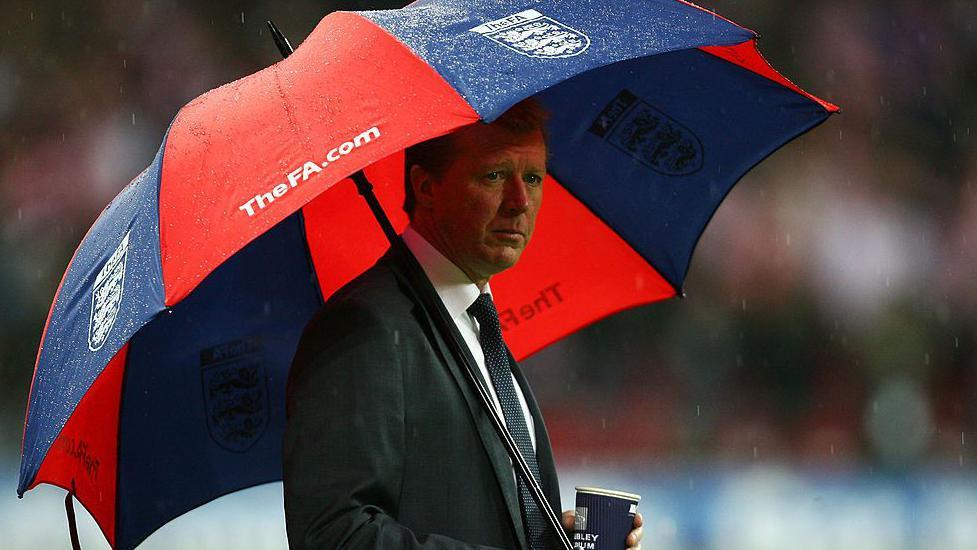Phil McNulty reflects on the increasingly dull nature of England’s World Cup qualifying matches, despite their consistent success. While statistically dominant, these games often lack excitement and fail to truly test the team’s capabilities. The article highlights memorable qualifying moments, like Beckham’s free-kick and Rooney’s debut, but contrasts them with the frustrating experience of campaigns like the one under Steve McClaren. It argues that the real challenge lies in translating qualifying form into success at major tournaments and emphasizes the importance of competitive fixtures against top-tier opponents.
England's deadly dull World Cup qualifying victory against Andorra had a Groundhog Day feel for long-time followers of this particular bandwagon. Routine win. Comfortable qualifying. And then this formality is often followed by disappointment when the serious business starts at a major tournament.
I've been fortunate enough to have covered England for almost a quarter of a century. While this is a huge privilege I enjoy immensely, games like Saturday's do make you reflect on World Cup qualifiers and ask "when was the last time one was really good?"
England’s qualification process has become, statistically, a story of dominance. They’ve lost only four World Cup qualifiers in the past 30 years and haven’t tasted defeat in these matches since 2009. Compared to other European powerhouses, only Spain and Germany have fewer losses during that period. Extending this to include European Championship qualifiers, England boasts an impressive record since 2004: 108 matches played, 84 won, and a mere six losses, scoring 292 goals and conceding just 51. This translates to a points-per-game ratio of 2.5 – enough to win the Premier League in all but three seasons.
Yet, despite these impressive numbers, a sense of excitement often feels absent. Qualifiers, by their nature, are often a means to an end, a stepping stone to the ultimate goal – a feat that has eluded the England men’s team since their glorious victory in 1966. The recent match against Andorra, played in front of thousands of empty seats at Villa Park, epitomized this lack of drama, with Andorra focused solely on damage limitation.
There have been moments of genuine excitement, of course. David Beckham’s sensational last-minute free-kick against Greece at Old Trafford in October 2001, securing qualification for the 2002 World Cup, remains etched in the memory of many fans. Similarly, Wayne Rooney’s stunning debut performance against Turkey in April 2003, a 2-0 victory at the Stadium of Light, signaled the arrival of a future star.
However, perhaps the most enduring image of a frustrating qualifying campaign is that of Steve McClaren sheltering under an umbrella during the Euro 2008 qualifier against Croatia at Wembley in November 2007. England, needing only a draw, lost 3-2 to a Croatia side that had already qualified. The image of McClaren, dubbed “Wally with the Brolly” by the press, became symbolic of a campaign that ended in heartbreak and failure.

The issue, it seems, isn’t necessarily a lack of success, but a lack of genuine challenge. As the number of teams qualifying for major tournaments has increased, so too has the disparity in quality between nations. England often find themselves facing opponents who are content to defend deep and absorb pressure, leading to games that are more about patience and control than attacking flair.
The statistics support this observation. Over the past 16 years, England’s possession in World Cup qualifiers has steadily increased, but the number of shots taken hasn’t followed suit. The average margin of victory in recent campaigns has also been relatively low. Is this a result of the widespread adoption of the “low block” defensive tactic, or a broader shift towards possession-based football? The answer is likely a combination of both.
Wayne Rooney, speaking on his BBC Sounds podcast this week, described these games as “horrible” and “pointless” to play in. He emphasized the need for more competitive fixtures, suggesting that matches against teams like Italy or Spain are the true tests of England’s progress. “You want to see England playing Italy or Spain, and until you do you actually don't know where England are at,” he stated.
While qualifying remains a necessary hurdle, it’s clear that it’s the challenge *after* qualification that truly matters. Thomas Tuchel’s primary task is to ensure England reach major tournaments, a feat that only Graham Taylor and Steve McClaren have failed to achieve in recent history. However, the real test of his leadership will be in transforming this dominant qualifying form into success on the biggest stage.
The upcoming match against Serbia in Belgrade represents a significant step up in competition and a chance for England to demonstrate their true potential. It’s a game that promises more jeopardy, more intensity, and hopefully, more excitement than the recent stroll against Andorra. For England fans, it’s a welcome reminder that the real drama is yet to come.
The question remains: when will England fans experience a truly thrilling World Cup qualifier? Perhaps the answer lies in a more competitive qualifying landscape, or perhaps it simply requires a team that can consistently break down stubborn defenses and deliver moments of genuine magic. For now, the wait continues.